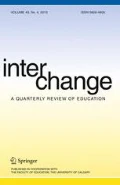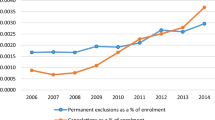Abstract
Positive behaviour for learning (PBL) was introduced to the state education sector in Queensland in the early 2000s in an effort to move schools away from use of punitive disciplinary practices towards a positive and supportive approach to student behaviour. Although around half of state schools in Queensland have received training to implement PBL, as yet no studies into the outcomes of PBL implementation in that state have been conducted. In the October, 2019 edition of Interchange an article by Paul and Cindy-lou Bleakley claimed to demonstrate a link between the widespread adoption of PBL and increasing rates of suspensions in Queensland state schools. In our article, we refute this claim and respond to several errors and misconceptions in the paper by Bleakley and Bleakley. First, we counter the claim that PBL takes a punitive approach to student behaviour and point out the ways in which PBL has been misconstrued. Next, we discuss flaws in the methodology used to assert a causal relationship between increasing rates of suspension and the introduction of PBL. To conclude, we reject the assertion that PBL replaced restorative justice as the preferred model of behaviour support in Queensland and argue that a restorative justice approach is not incompatible with implementation of PBL
Similar content being viewed by others
References
Bacher-Hicks, A., Billings, S. B., & Deming, D. J. (2019). The school to prison pipeline: Long-Run impacts of school suspensions on adult crime (No. w26257). National Bureau of Economic Research.
Bradshaw, C. P., Mitchell, M. M., & Leaf, P. J. (2010). Examining the effects of schoolwide positive behavioral interventions and supports on student outcomes: Results from a randomized controlled effectiveness trial in elementary schools. Journal of Positive Behavior Interventions, 12(3), 133–148. https://doi.org/10.1177/1098300709334798
Braithwaite, J. (1989). Crime, shame and reintegration. Cambridge University Press.
Cameron, L., & Thorsborne, M. (2001). Restorative justice and school discipline: Mutually exclusive. In H. Strang & J. Braithwaite (Eds.), Restorative justice and civil society (pp. 180–194). Cambridge University Press.
Casella, R. (2003). Zero tolerance policy in schools: Rationale, consequences, and alternatives. Teachers College Record, 105(5), 872–892. https://doi.org/10.1111/1467-9620.00271
Chitiyo, M., May, M. E., & Chitiyo, G. (2012). An assessment of the evidence-base for school-wide positive behavior support. Education and Treatment of Children, 35(1), 1–24. https://doi.org/10.1002/pits10.1901/jaba.2007.659-67210.1348/000709900158056
Deloitte Access Economics. (2017). Review of education for students with disability in Queensland state schools. Retrieved from https://education.qld.gov.au/student/Documents/disability-review-report.pdf. Accessed 3 March 2017.
Flannery, K. B., Guest, E. M., & Horner, R. H. (2010). Schoolwide positive behavior supports. Principal Leadership, 11(1), 38–43.
Gage, N. A., Leite, W., Childs, K., & Kincaid, D. (2017). Average treatment effect of school-wide positive behavioral interventions and supports on school-level academic achievement in Florida. Journal of Positive Behavior Interventions, 19(3), 158–167. https://doi.org/10.1177/1098300717693556
Graham, L. J. (2018). Questioning the impacts of legislative change on the use of exclusionary discipline in the context of broader system reforms: A Queensland case-study. International Journal of Inclusive Education. https://doi.org/10.1080/13603116.2018.1540668
Hawkins, J. D., Catalano, R. E., Kosterman, R., Abbott, R., & Hill, K. G. (1999). Preventing adolescent health-risk behaviors by strengthening protection during childhood. Archives of Pediatric and Adolescent Medicine, 153(3), 226–234.
Hemphill, S., Broderick, D., & Heerde, J. (2017). Positive associations between school suspension and student problem behaviour: Recent Australian findings. Trends & Issues in Crime and Criminal Justice no. 531. Australian Institute of Criminology. Retrieved from https://aic.gov.au/publications/tandi/tandi531. Accessed 5 May 2019.
Horner, R. H., Sugai, G., Smolkowski, K., Eber, L., Nakasato, J., Todd, A. W., & Esperanza, J. (2009). A randomized, wait-list controlled effectiveness trial assessing school-wide positive behavior support in elementary schools. Journal of Positive Behavior Interventions, 11(3), 133–144. https://doi.org/10.1177/1098300709332067
Jacobsen, W. C., Pace, G. T., & Ramirez, N. G. (2019). Punishment and inequality at an early age: Exclusionary discipline in elementary school. Social Forces, 97(3), 973–998. https://doi.org/10.1093/sf/soy072
Lewis, T., & Sugai, G. (2004). Effective behavior support: A systems approach to proactive schoolwide management. In D. Mitchell (Ed.), Special educational needs and inclusive education: Major themes in education (Vol. 3, pp. 249–287). Routledge.
Luiselli, J. K., Putnam, R. F., Handler, M. W., & Feinberg, A. B. (2005). Whole-school positive behaviour support: Effects on student discipline problems and academic performance. Educational Psychology, 25(2–3), 183–198. https://doi.org/10.1080/0144341042000301265
Mooney, M., Dobia, B., Power, A., Watson, K., & Yeung, A. (2008). Positive behaviour for learning: Investigating the transfer of a United States system into the New South Wales Department of Education and Training Western Sydney region schools. Retrieved from http://researchdirect.westernsydney.edu.au/islandora/object/uws:132. Accessed 18 Aug 2018.
Muscott, H. S., Mann, E. L., & LeBrun, M. R. (2008). Positive behavioral interventions and supports in New Hampshire: Effects of large-scale implementation of schoolwide positive behavior support on student discipline and academic achievement. Journal of Positive Behavior Interventions, 10(3), 190–205. https://doi.org/10.1177/1098300708316258
OSEP Technical Assistance Center on Positive Behavioral Interventions and Support. (2015). Positive behavioral interventions and supports (PBIS) implementation blueprint. Retrieved from https://www.pbis.org. Accessed 19 Apr 2016.
Poed, S., & Whitefield, P. (2020). Developments in the implementation of positive behavioral interventions and supports in Australian schools. Intervention in School and Clinic, 56(1), 56–60. https://doi.org/10.1177/1053451220910742
Ross, S. W., Romer, N., & Horner, R. H. (2012). Teacher well-being and the implementation of school-wide positive behavior interventions and supports. Journal of Positive Behavior Interventions, 14(2), 118–128. https://doi.org/10.1177/1098300711413820
Simonsen, B., Eber, L., Black, A. C., Sugai, G., Lewandowski, H., Sims, B., & Myers, D. (2012). Illinois statewide positive behavioral interventions and supports: Evolution and impact on student outcomes across years. Journal of Positive Behavior Interventions, 14(1), 5–16. https://doi.org/10.1177/1098300711412601
Simonsen, B., & Sugai, G. (2019). School-wide positive behavioral interventions and supports: A systems-level application of behavioral principles. In S. G. Little & A. Akin-Little (Eds.), Applying psychology in the schools book series. Behavioral interventions in schools: Evidence-based positive strategies (pp. 35–60). American Psychological Association.
Skiba, R. J. (2013). Reaching a critical juncture for our kids: The need to reassess school-justice practices. Family Court Review, 51(3), 380–387. https://doi.org/10.1111/fcre.12034
Sugai, G., & Horner, R. H. (2006). A promising approach for expanding and sustaining school-wide positive behavior support. School Psychology Review, 35(2), 245–259.
Sugai, G., & Horner, R. H. (2002). The evolution of discipline practices: School-wide positive behavior supports. Child and Family Behavior Therapy, 24(1–2), 23–50. https://doi.org/10.1300/J019v24n01_03
Swayn, N. F. (2018). Influences on the exclusion decisions of Queensland state secondary school principals. Doctoral dissertation, Queensland University of Technology. Retrieved from https://eprints.qut.edu.au/118673/. Accessed 26 Feb 2019.
Wolf, K. C., & Kupchik, A. (2017). School suspensions and adverse experiences in adulthood. Justice Quarterly, 34(3), 407–430. https://doi.org/10.1080/07418825.2016.1168475
Yeung, A., Barker, K., Tracey, D., & Mooney, M. (2013). School-wide positive behavior for learning: Effects of dual focus on boys’ and girls’ behavior and motivation for learning. International Journal of Educational Research, 62, 1–10. https://doi.org/10.1016/j.ijer.2013.06.002
Funding
The authors received no financial support for the research, authorship, and/or publication of this article.
Author information
Authors and Affiliations
Contributions
Both authors contributed to the structuring and content of the paper. Both authors reviewed and approved the final manuscript.
Corresponding author
Ethics declarations
Conflict of Interest
The authors declared no potential conflicts of interest with respect to the research, authorship, and/or publication of this article. This is an original piece of research, not submitted elsewhere for publication.
Additional information
Publisher's Note
Springer Nature remains neutral with regard to jurisdictional claims in published maps and institutional affiliations.
Rights and permissions
About this article
Cite this article
Hepburn, L., Poed, S. Deviating from the Data: A Response to Bleakley and Bleakley. Interchange 52, 193–201 (2021). https://doi.org/10.1007/s10780-021-09431-7
Received:
Accepted:
Published:
Issue Date:
DOI: https://doi.org/10.1007/s10780-021-09431-7




